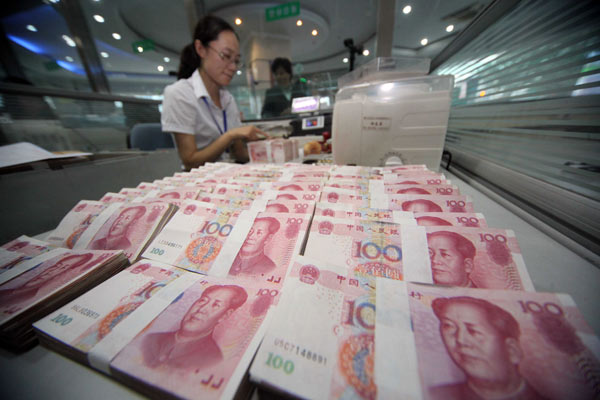Yuan gains the most in 20 years vs US dollar
 0 Comment(s)
0 Comment(s) Print
Print E-mail China Daily, October 17, 2013
E-mail China Daily, October 17, 2013
|
|
|
A clerk counts money at a bank in Ganyu, Jiangsu province. Yuan has appreciated 43 percent since a new exchange rate mechanism was implemented in 1994. [China Daily] |
The yuan traded stronger than 6.10 per dollar for the first time in 20 years after the central bank raised its daily fixing rate to a near record high and the nation stepped up efforts to increase the Chinese currency's global use.
The yuan strengthened for three consecutive days and closed at a record high of 6.0995 against the US dollar in Shanghai on Wednesday amid the ongoing impasse over US debt talks, China Foreign Exchange Trade System prices showed.
It touched 6.0965 earlier, the strongest level since the government unified the official and market exchange rates at the end of 1993.
The last time the currency traded below 6.1 to the dollar was on Dec 27, 1993, when it was at 5.8245. It weakened to 8.7217 on Jan 6, 1994, after a new exchange rate mechanism was implemented. It has appreciated 43 percent since then. The yuan's moves are restricted to 1 percent on either side of the reference rate set every day by the People's Bank of China, the nation's central bank.
The central parity rate of the yuan against the US dollar advanced four basis points to 6.1408 on Wednesday, according to data from the central bank. The central parity rate of the yuan against the US dollar is based on a weighted average of prices before the opening of the market each business day.
Democratic and Republican leaders in the US Senate could announce a deal soon to extend the government's borrowing authority and quickly re-open federal agencies that have been closed since Oct 1, reported Reuters on Wednesday, citing a Senate aide.
Analysts said the price of the US dollar against the yuan may fluctuate because it will take time for the market to digest both the results of the US debt talks and possible continuous yuan appreciation.
"Many factors are affecting the foreign exchange market at the current time, including decision makers' stands toward the ongoing rising price of the yuan against the US dollar," said Zhou Yunxie, a foreign exchange analyst with Shanghai-based Zhongqing Gold Investment Co.
Recent economic data may indicate that China is going to see another round of yuan appreciation, according to Liu Dongliang, an analyst with China Merchants Bank.
Market insiders said the breakout on Wednesday through 6.1 has a psychological effect on market participants.
There have not been any large State-run banks buying dollars from the currency market since Monday, which has also affected market sentiment.
"We have not seen any big buys of dollars in recent days. The market has a prudent sentiment at the moment waiting for guidelines from policymakers. There may be a wider trading band or more capital market reforms to be introduced," said a Shanghai-based trader with a State-owned bank who preferred not to be named.
The yuan on the onshore spot market since Monday has reversed positions with the offshore yuan market in Hong Kong because market participants did not prepare for further gains after robust advances since June.
The continued positive momentum in Chinese economic data, in the context of the broad-based US dollar weakness, is likely to support a return of portfolio inflows and further appreciation in the yuan this year, said Nick Verdi, a foreign exchange analyst with Barclays Research in a recent note.
Authorities have taken steps in recent weeks to promote the use of the yuan in international trade. On Tuesday, China and the United Kingdom agreed to continue to build London into a major offshore market for yuan trading, underlining the strong financial ties between the two countries.







Go to Forum >>0 Comment(s)